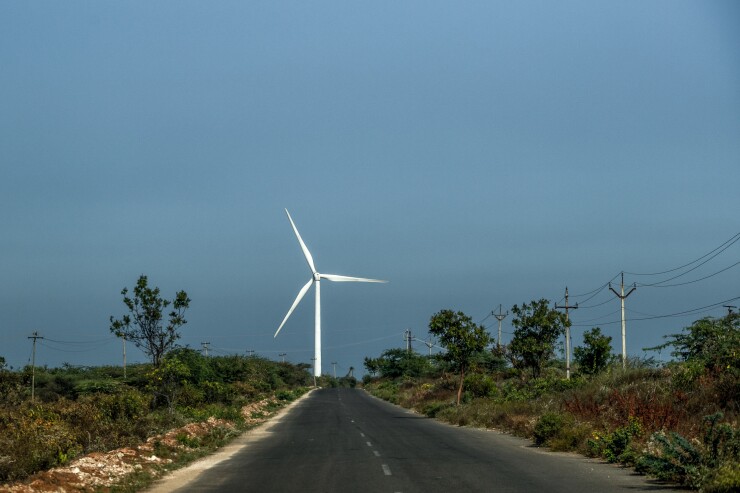(Bloomberg) --Solar and wind energy companies are betting on a novel form of insurance to protect their assets against wild and volatile weather — the very type of climate risk they were set up to fight.
Renewable power projects can lose substantial revenue if the wind fails to blow, if clouds block the sun, or when a hurricane slams into expensive infrastructure. To protect against such climate-induced losses, many owners are turning to
Even so, more clean-energy companies are using parametric insurance to supplement traditional indemnity programs. "It's definitely an area we see growing massively," said Marcel-Steffen Reif, global head of weather and AgRisk Partners at reinsurer Munich Re.
The shift is being driven by the rising impact of global warming on green assets. In Texas, solar farms are routinely battered by hail, while wind farms
Indonesia, Malaysia and Brunei have witnessed large declines in solar irradiation, and Qatar and Kuwait have seen a slump in wind speed this century, according to Copernicus Climate Change Service
The threat is especially severe in India, where Prime Minister Narendra Modi's plan to more than double renewable energy capacity by 2030 could be undermined by the country's high susceptibility to wind droughts and reduced solar irradiation. Wind power generation there fell by 0.77 petawatt-hour per decade between 1980 and 2016, according to a 2018
Such unpredictability "increases the amount of equity needed to fund a project, which is obviously a barrier to development," said
A few years ago, ReNew Energy Global Plc bought parametric insurance for a modest-sized project, seeking to protect revenues from a potential drop in wind speed. But when it made a claim, the insurer declined to pay, saying the fault lay with a faulty turbine instead of variable weather. ReNew says the lack of a payout discouraged it from buying parametric cover for larger projects.
"Wind has continued to underperform in the last three to four years" so the declines will have to be significantly worse to get insurers to pay out, said Kailash Vaswani, chief financial officer of ReNew. "It's basically heads they win, tails you lose."
Some clean-energy companies worry about the cost. Actis GP LLP, which manages $108 billion in assets together with parent General Atlantic, is in discussions with insurers "to see whether the pricing level justifies the risk coverage," said
Foreign insurers, nonetheless, see a growing opportunity in emerging markets. Munich Re says it has received "first requests" from clean energy companies in India and China. Willis Towers Watson Plc says it has seen a "doubling of demand" from Indian developers since 2023. Paris-based Descartes Underwriting is
"There's no comparable product in the traditional markets," said Christopher Au, director, climate practice and alternative risk transfer solutions for Asia Pacific at WTW. Banks are setting requirements for some assets to be insured, which "is an important motivating factor for developers," he said.
The promise of speedy payouts has made parametric deals especially popular as a hedge against losses tied to the physical impact of global warming — everything from more intense wind gusts that dislodge solar panels, to more frequent lightning strikes that damage turbines. When Typhoon Rai hit the Philippines in late 2021, Aboitiz Power Corp. was able to collect a parametric payout within 30 days and quickly repair the damage caused to its renewable energy assets.
"Extreme weather events are more severe and more frequent in the Asia region," said
To contact the authors of this story:
Ishika Mookerjee in Singapore at
Minmin Low in Hong Kong at






